- Slug: BC-CNS-New Citizens,811
- Photos available (thumbnails, captions below)
By EMILY L. MAHONEY
Cronkite News
PHOENIX – When Abraham Martinez – “like Abraham Lincoln,” he said – raised his right hand in a courtroom on Friday to take the oath of allegiance in a citizenship ceremony with 71 other people, news about the immigration debate was on his mind.
After recent protests at airport over refugees, a ban on immigrants from some majority-Muslim countries and the border wall, the naturalization ceremony served as a reminder of the United States’ foundations of inclusion, said Martinez, 31, an immigrant from Morelia, Mexico.
“We’re living in a time of turmoil,” he said. “Having this type of ceremony and being able to be united from different cultures, from different countries, is very emotional and it speaks a lot about this country how we’re able to recognize citizens from different cultures and really embrace them into the country.”
He has lived in the U.S. for 13 years, but said becoming a citizen marked a very special day in his life.
During the ceremony immigrants took the oath of allegiance and pledged to support the U.S. “against all enemies, foreign and domestic,” and sang the national anthem in unison with a wide range of accents. Some were teary-eyed, and all waved mini American flags.
Those who became naturalized citizens Friday are from 21 countries, ranging from Australia to Cameroon to Nepal and Romania, but nearly half are from Mexico.
“The perception of my home country from the very famous speech of the current president, they were very troubling to me, as I’m well-educated; I have a PhD,” Martinez said.
He wants to work to change stereotypes about Mexican immigrants, he said.
“I think I’m an active part of society and a positive aspect of society as well,” Martinez said. “My hope is that all of us make a difference regardless of political views and where people stand we determine our own future.”
Within his first few days in office, President Donald Trump signed executive orders calling for immediate planning and construction of a border wall, hiring 5000 new Border Patrol agents and cutting off some federal grant funding for “sanctuary cities.” Another executive order suspended all refugees from entering the U.S. for 120 days and issued a travel ban for seven majority-Muslim nations for three months.
Marcus Samuel, a newly naturalized citizen from India, said people should follow immigration laws.
“Anyone who goes to any other country has to have a legal permit,” Samuel said. “If you come to America it’s very, very liberal and open. It has given opportunity to hundreds of thousands of people but it’s the responsibility of the immigrant to have their papers. … It’s the right thing to do.”
Samuel has been living in the U.S. for 25 years working as a physical therapist. His children are also U.S. citizens. One is a commercial pilot and the other a special education teacher, he said proudly.
But Carla Miller, 34, from Brighton, England understands why some people don’t immigrate legally the way she did. “I have a lot of people say to me, ‘Aren’t you mad that you spent two years apart from your husband so that you could get your visa all sorted, and yet there are so many people who come in illegally?’ No, because I have a home to go to in England. I have family. I have money. I have a job and there are people who just plain can’t do that and so, quite frankly, they deserve it,” she said.
A stay-at-home mother of three, she said she’s created a Tempe mom’s group where she hopes to start organizing work to help immigrants, such as putting together kits for newly-arrived refugees.
Miller’s husband, whom she met while attending Arizona State University, is a refugee from El Salvador who is now also a citizen. She said she is deeply troubled by Trump’s ban on refugees from some countries.
“For Trump to say that to people like me, who have all the legal documentation for coming in, that’s harsh because we take a very long time and are very proud of the fact that we spend so much money and effort doing the right thing,” Miller said. “For somebody just on a power trip to turn around and say, ‘I have decided that I don’t want you to come in,’ not only do I feel it’s unconstitutional but it’s harsh and unfair.”
Despite this divisive political climate, Miller said the naturalization ceremony symbolizes a reason for hope.
“As far as I’m concerned that little room represents all that is good about America,” she said. “That we’re all from everywhere we all have the same goals and we all have the ability to make America better.”
Cronkite News reporter Anthony Mitchell contributed to this report
^__=
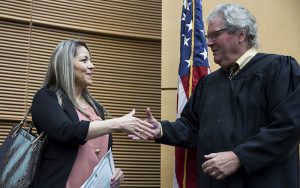
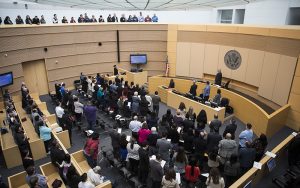
(Photo by Johanna Huckeba/Cronkite News)
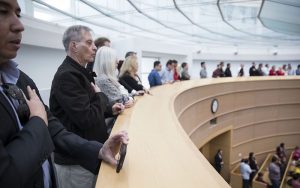
(Photo by Johanna Huckeba/Cronkite News)
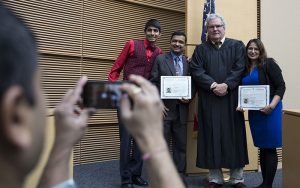
(Photo by Johanna Huckeba/Cronkite News)
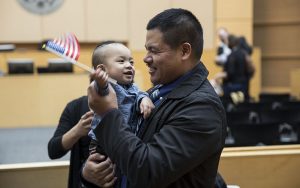
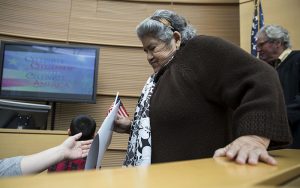
(Photo by Johanna Huckeba/Cronkite News)